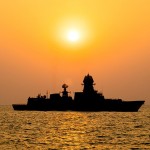While the Indian government’s focus from January 2021 was fixed on the Indo-Pacific with a sustained endeavour to strengthen the Quad, policy attention has shifted back to the Indian Ocean since October 2023. Of course, the Indo-Pacific strategy covers both the Pacific and Indian Oceans, but when danger deepens, the immediate neighbourhood matters more than distant shores.
The Maldives, with Mohamed Muizzu as President, seems to be heading on a collision course with India. Despite New Delhi’s patience and diplomatic tact, Malé continues to deepen its embrace of China. In contrast, Sri Lanka showed greater sensitivity to India’s security concerns by imposing a year-long moratorium on foreign research ships, including Chinese ones, to its ports. Last month, India’s SAGAR policy produced a valuable dividend as the Prime Ministers of India and Mauritius inaugurated a new airstrip and a jetty in the Agaléga Islands, boosting Mauritius’s capability to curb illegal activities in its vast Extended Economic Zone.
Both the Western Indian Ocean littered with island nations and the Northern Indian Ocean stretching from the Arabian Sea to the Suez have become active geographies again. The gradual regionalisation of the Israel-Hamas conflict, as reflected in the attacks by Houthi rebels on international shipping, has now led to a massive drop in transits through the Suez Canal. The diversion of ships to the longer route around the Cape of Good Hope adversely affects all nations in the region, big or small.
The new chain of developments is set to expand the Chinese Navy’s footprint in the region. Its broad objective is to assert dominance. With the Maldives as a willing partner, Beijing lost little time in announcing a new agreement under which unspecified military assistance would be extended gratis to Maldives. This comes when 88 Indian military personnel, deployed with the host nation’s consent to operate humanitarian flights of three aviation platforms, has been replaced by a civilian group.
The strategic contestation between China and India is intensifying. Much of China’s trade and energy supplies pass through the region, so its case for security for its supply routes cannot be dismissed. But what is worrisome is its strategic intent to create an adverse environment for India’s security by turning the country’s neighbours against it. A clear pattern is emerging behind Beijing’s quest for naval bases in Djibouti, Kyaukphyu, Gwadar, and Hambantota. This, combined with the nearly four-year-old border standoff, which has defied a diplomatic resolution, has meant the two nations continue to confront each other as adversaries.
India has been facing a “bully” in a very “determined manner,” observed India’s defence secretary recently. He spoke not only of the border situation but also of the Indo-Pacific where “a pivotal moment” was being witnessed. India and the U.S., he underlined, were key stakeholders in the Indo-Pacific region. Cooperation helps them in addressing the strategic competition with China. Collaboration in underwater domain awareness has been identified as a key goal in dealing with the “emerging” threats.
Besides the U.S., where do the U.K., European Union, France, and Germany stand as far as Indian Ocean rivalries are concerned? Geographic proximity to the region demands that they take a clear line on China’s activities. While they are concerned about Beijing’s illegal claims in the South China Sea, they must see that a similar kind of assertiveness and hostile intent is building up in the Indian Ocean too. Each of these players seeks closer economic and security cooperation with India, and incremental progress is taking place. But they display a ‘studied ambiguity’ when it comes to interpreting China’s behaviour and the long-term motivations driving it. The geographic distance of the European nations from China gives them a sense of security. They should re-examine the fundamental tenets of their Asia strategy. But will they, given their excessive preoccupation with the conflicts in Ukraine and Gaza? Recent interactions with European officials and scholars generate limited hope; therefore, the task to persuade them must go on.
The government has other options too. First, India needs to convey a clear message to its strategic partners that while it is conscious of its Indo-Pacific responsibilities, it prioritises the Indian Ocean region. Second, a critical audit of the Indian Ocean Rim Association (IORA) and the Colombo Security Conclave (CSC) is needed. While IORA is underperforming and has become too amorphous to be effective, the CSC faces the danger of losing a key member, the Maldives, if the island nation’s partnership with China deepens. It may be time for New Delhi to encourage the creation of a new mechanism with the objective of bolstering maritime security and optimising the potential for the Blue Economy. This group could comprise four nations from the neighbourhood (India, Sri Lanka, Bangladesh, and Myanmar) and four island states (Mauritius, Seychelles, Comoros, and Madagascar). The ninth seat may be kept for the Maldives if it adopts a sensible policy. This group can be named the ‘Indian Ocean Cooperation Organisation.’ Third, Foreign Affairs Insights & Review ranked the Indian Navy the seventh most powerful in the world. As India aims to become the third largest economy, it should find new budgetary resources for its Navy to make it the third or fourth strongest.
Both the Western Indian Ocean and the Northern Indian Ocean have become active geographies again.
Rajiv Bhatia is Distinguished Fellow, Foreign Policy Studies, Gateway House, and a former ambassador.
This article was first published by The Hindu.
Support our work here.


